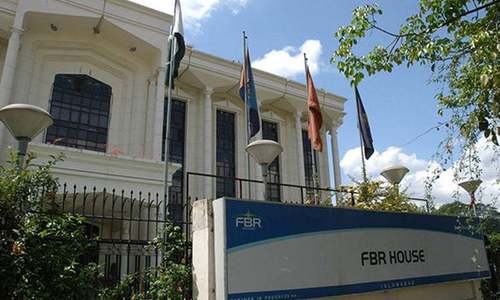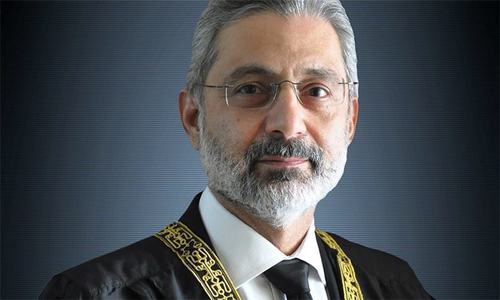ISLAMABAD: The Supreme Court on Tuesday asked Sarina Isa not to involve Chief Justice Gulzar Ahmed in the controversy over constitution of the bench to hear her husband Justice Qazi Faez Isa’s review petition against the SC full court judgement in a case pertaining to the presidential reference against him.
“What you are doing has never happened in this court and now you have started dragging the chief justice [in the controversy],” regretted Justice Umar Ata Bandial while heading a six-judge SC bench.
“Don’t step over your limits,” Justice Bandial warned Mrs Isa and said the chief justice had done nothing wrong because as the head of the supreme judiciary he could constitute any bench. Rather he had shown a kind gesture by constituting the larger bench, otherwise it could have been a two-member or three-member bench to determine whether a larger bench or the bench comprising the judges who had authored the majority judgement should hear the review petition.
The observation came when Mrs Isa asked each member of the bench whether the six-judge bench could overrule the majority judgement of the seven judges who were part of the earlier 10-judge full court.
Can six-judge bench overrule majority judgement, court asked
Mrs Isa said her fundamental rights would be breached if the three judges, who had written dissenting opinion in the Justice Isa case, were excluded from the bench hearing his review petition. The chief justice should maintain a balance since being then a member of the Supreme Judicial Council and now the head of the council, he was a party and a respondent in the matter, she argued.
“Please don’t decide my fate by excluding the three minority judges, rather it should be decided by all the members who heard the petitions against the filing of the presidential reference,” she insisted.
Citing Rule 26 Order 8 of the Supreme Court Rules 1980 that asks the same bench which issues a verdict to hear review petition against it, she said she was unable to understand why the Supreme Court was not following the rule.
Justice Bandial responded that the court had registered her point of view but she had to respect the institution (judiciary) and the office of the chief justice.
Mrs Isa apologised, saying she did not mean any offence.
Taking the rostrum next, Muneer A. Malik, the counsel for Justice Isa, quoted Order 26 Rule 8 of the court rules to emphasise that a majority judgement was the verdict of the court. To substantiate his point, he cited Zulfikar Ali Bhutto case, 1989 Haji Saifullah case, 1988 Malik Asad Ali case, 2009 judges case, 2014 Pervez Musharraf case and 2010 Mubashir Hasan case.
Justice Muneeb Akhtar, a member of the bench, recalled that except for the Bhutto case, all the judgements cited by the counsel were unanimous.
The counsel responded that the majority decision in the Justice Isa case was the decision of the full court and, therefore, it should be reviewed by the full court.
Hamid Khan, representing four bar associations, endorsed Mr Malik and said there appeared to be some misunderstanding.
Justice Akhtar asked the lawyers to read the language of the court rules which said that as far as practical, a review petition should be heard by the same bench. If this point of view was accepted, then would it mean that if there was a review petition against a minority judgement why all the 10 judges should hear it, he added.
Justice Bandial asked the counsel to take time to ponder over since the lawyer had been taken by surprise.
“The way we understand is that the purpose of the review petition is correction of the judgement,” Justice Bandial said, adding that the court wanted to reach a right decision based on the Constitution and the law, and not for public consumption.
Justice Akhtar again emphasised that the ratio of the judgement could only be overturned by a larger bench and that the dissenting view could not be reviewed since it was not the judgement of the court.
Advocate Rasheed A. Razvi, representing the Sindh High Court Bar Association, cited the 1923 All England Report and highlighted the public perception that justice should not only be done but also seemed to be have been done. If the judges who had authored minority opinion were excluded from the bench what impression the bar would get from it, he asked.
Justice Akhtar observed that it was the duty of the bar to accept explanation of a law by the court instead of saying that injustice had been done. “It is a sad day for us if such a statement is coming from such a senior and elderly counsel of the bar,” he deplored.
Justice Bandial said what public perception the counsel was conveying, that the present bench could not decide the review petition or he wanted judges of his choosing.
The counsel said the bar had always supported and upheld the independence of judiciary.
Justice Bandial asked could the independence of judiciary come without accountability of judges, emphasising that the judges should clear their names since many things happened which were painful.
Mrs Isa said she had never been heard and, therefore, it was all the more necessary that she should be heard by all the judges, including those who had authored minority judgements.
The court postponed the further proceedings to Thursday when it would hear Supreme Court Bar Association president Latif Afridi.
Published in Dawn, December 9th, 2020















































